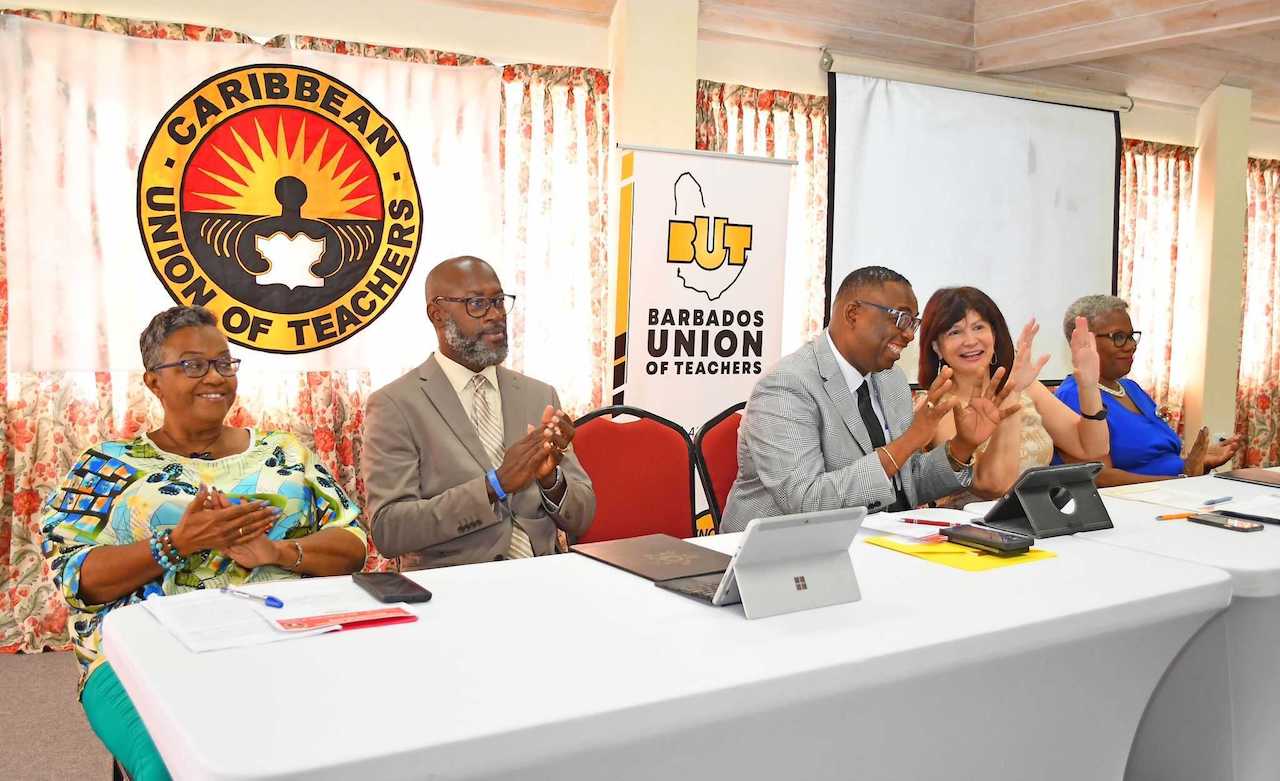Ministry of Education Urges Teacher Unions to Collaborate for Education System Reforms

December 12, 2023
"Senior Ministry of Education official urges teacher unions to collaborate, emphasizing the importance of unity in achieving quality education. Calls for non-adversarial negotiations and fostering positive relationships."
A senior Ministry of Education official has urged teacher unions to view the ministry as a collaborator rather than as an enemy, issuing a call for unity as officials embark on the largest education system reforms in generations.
Deputy Chief Education Officer Joy Adamson conveyed a message that administrators and educators all had the common goal of achieving quality education for all that could only be achieved if all parties worked together. She was addressing the opening of a two-day executive meeting of the Caribbean Union of Teachers (CUT) at the Barbados Beach Club on Maxwell Coast Road.
Adamson stressed the importance of collaborative efforts. She encouraged a non-adversarial approach to negotiations and urged teachers’ unions to foster camaraderie among members while maintaining positive relationships with employers.
“My message is simple, let us work together,” she declared. “So how do we together tackle teacher burnout? How do we work together to ensure that as teachers fight for their rights, that the education of our children is not compromised? So how do we ensure that our shop stewards understand the industrial process and grievance procedures? As teacher unions, how do you encourage camaraderie among your members, but also facilitate positive relationships between them and their employer?
“We need to be working as partners, we need to be collaborating, we need to keep the communication channels open and discuss before taking action. We need to forge alliances with the necessary agencies. We need to pull together because we share a common goal – quality education for all. Let’s work together . . . . As we tackle the worldwide issues of climate change, natural disasters, learning loss due to the pandemic, [and] deteriorating school plants, let us work together.”
Emphasising the importance of working collectively, Adamson said that trust among stakeholders is built through continuous communication, training, education, and a shared commitment to quality education. She urged teachers to engage with the ministry regarding educational transformation and avoid a negative disposition towards it.
“My ministry here in Barbados has heard the cry from the nation to chart a new path and transform the educational system in Barbados. To this end, we have started consultations with all stakeholders . . . . We have engaged with the unions here . . . and have formed several committees including teachers. Yet, we hear that teachers are not involved in the reform.”
Stressing that any reform needs buy-in from teachers, she encouraged unions to engage their members and ministries.
“No one likes change – maybe only a wet baby – so let us work together,” the ministry official urged.
CUT president Dr Garth Anderson emphasised the crucial nature of union meetings with education labour movements, citing an evolving and increasingly hostile school environment.
He highlighted the need for local constructs in managing discipline and stressed the importance of rules in maintaining order and teaching discipline.
“Our schools cannot carry out their mandate – that of preparing the next generation in optimising their full potentials – in an environment that is increasingly becoming hostile and unsafe. Many in our societies question what is happening in our schools when we examine the level of violence and total breakdown in discipline. Every school has its own ecology and sociology and so no one-size-fits-all can or will work. The management of discipline must be a local construct. School administrations must take charge and work with local stakeholders to determine within the framework of a policy to treat this matter. The policy cannot be seen as a prescription but a guide in the entire process,” the CUT head said.
Touching on the global teacher shortage, he noted that Caribbean educators were migrating to North America and Europe to pursue better opportunities, crippling the education systems in their homelands. He suggested that regional governments should ensure there is adequate funding for public education.
“As we speak, the world needs approximately 69 million teachers as teachers are not just migrating but resigning and leaving the profession, citing stress, [being] overworked, underpaid and being undervalued,” Dr Anderson said.
President of the Barbados Union of Teachers Rudy Lovell encouraged participants to approach reform discussions with an open mind, considering the potential benefits for regional educational systems. (SB)


